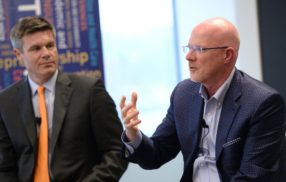
Business of Health: Darden Expands Health Care Presence, Partnerships
By Dave Hendrick
Dr. Rick Shannon, executive vice president for health affairs at the University of Virginia, believes he needs to reduce his organization’s cost structure by about 20 percent in the coming years, largely to meet an expected significant compression in insurance reimbursements to the UVA Health System.
Shannon doesn’t plan to meet the goals by reducing services or eliminating staff; rather, like many in the tumultuous and rapidly evolving health care space, he’s working toward dramatic improvements in efficiency and care models to improve patient outcomes and to cut costs, two items that are closely linked.
“Process excellence drives value,” Shannon told attendees of a Darden School of Business alumni event in April. “We now have examples where we have been able to perfect the process to the point where we can drive both better outcomes and lower the costs.”
In addition to process improvement and perfection, Shannon says the UVA Health System is heavily borrowing lean principles from other industries and increasingly looking to disruptive technologies to drive innovation.
Shannon, a member of the Darden School Foundation Board of Trustees, said the UVA Health System is already showing significant improvements from predictive analytics, for instance, and looks ahead to a future in which a nurse checks a computer each morning for the “forecast” of each patient under their care that day.
Process improvements. Predictive analytics. Disruptive technology. Health care is a field with an outsized impact on the U.S. economy that, according to the Bureau of Labor Statistics, will grow nearly 20 percent from 2014 to 2024 and add jobs faster than any other occupation.
Is it any wonder interest in the industry has grown with Darden and its students? The School was already recognized by MBA Crystal Ball on its list of the best MBA programs for health care, writing that the Darden MBA “imparts expertise in the various facets of biotech, health service, medical device and pharmaceutical sectors to students.”
Embracing Upheaval
Aldea Meary-Miller (MBA/MPH ’17) took a job in health care communications out of college and soon fell in love with the industry, in part due to — not in spite of — what she describes as the current sense of “change and upheaval.”
“I dove headfirst into the acronyms and policy, and after a while, the work that my clients were doing was so interesting that I wanted to be doing it instead of talking about it,” said Meary-Miller.
Meary-Miller came to Darden for the MBA/master of public health dual degree track, a three-year program that involved taking the Darden First Year core curriculum, followed by two years of splitting time between courses at Darden and the UVA School of Medicine’s Department of Public Health Sciences. Darden also offers an MBA/MD dual degree with the UVA School of Medicine.
The former president of the Health Care Club at Darden, an organization with about 80 students, Meary-Miller calls herself atypical of most Darden students interested in the field, as her primary interests and focus have been at the provider level.
Students who pursue health care at Darden often lean toward the pharmaceutical or the medical device industries, which are “viewed as the more business-oriented tracks,” Meary-Miller said.
Meary-Miller said she spoke to prospective students often over the years, telling those interested in health care that Darden offered the opportunity to distinguish themselves in the space. The School also offers limitless choices for independent study, an opportunity Meary-Miller availed herself to with the UVA Health System’s telemedicine department.
The recent graduate, who said she “found that I used something from every one of my First Year classes” when she began her work at the health system, worked with the telemedicine department on customer acquisition strategy and streamlining operations, eventually presenting her findings at the annual conference of the Mid-Atlantic Telehealth Resource Center.
Meary-Miller is now headed to a leadership development program at the University of California San Francisco Health System, a two-year program that will build competencies in a variety of areas under the umbrella of operations and strategy.
As to whether she feels trepidation entering a deeply unsettled and endlessly complicated field, the recent Darden alumnae said the flux represented opportunity.
“For me, it’s all opportunities, because if I can understand something better, then I can build a better system to accommodate it,” Meary-Miller said. “That’s what attracts me to health care.”
A Quietly Robust Network
The number of Darden graduates going into the health care field remains modest compared to perennially popular sectors like consulting, finance and technology, although there has been an increase in the Class of 2017, with roughly 3 percent going into the field. Many Darden graduates at consulting firms often work in health care, as well.
Darden graduates can be found in the top ranks of leading health systems, device companies and pharmaceutical firms, and the Darden Executive MBA program often has multiple health care professionals in any given class.
Daniel Lynch (MBA ’84), a biotech and pharmaceutical industry veteran who helped revive ImClone’s fortunes as CEO after the company was famously tarnished in the stock-trading scandal involving Martha Stewart, currently serves as chair of six Boston-area biotech firms.
Lynch said the qualities that make a leader in the health space are often as much about general management as sector expertise.
“Expertise in a single function doesn’t translate into being a great CEO,” said Lynch, who has helped take four companies public in recent years and also serves as a senior advisor at Third Rock Ventures. “It’s being a great strategist. It’s being a great communicator. It’s inspiring various constituencies — your board, shareholders, employees, patient advocacy groups. It’s creating a culture that is patient-centric that is so compelling that people who have all sorts of opportunities want to work with you.”
Lynch, who recently came to Darden to speak to a group of students interested in health care and biotech, said it was a “broader philosophical question” for Darden as to whether to pursue a greater emphasis on a specialized health care concentration, but said there appeared to be opportunities for enhanced connections between students and alumni in the field.
“How do we leverage the health care alumni more broadly and more systemically?” Lynch said. “It’s a big opportunity because there are a lot of people out there.”
Kevin Wang (MBA ’17), the outgoing president of the Health Care Club, said he saw indications of growing interest in the field during his time at Darden. As president of the club, he sought to emphasize the variety of career opportunities in the field.
“One of the strengths of the Health Care Club is helping students navigate the complexities of the industry through speakers, workshops and shadowing opportunities so that they can zone in on what they want to do down the road,” Wang said.
During the school year, Wang said members of the club also worked with local health care businesses to help with operations and strategy.
The next administration of the club plans more integration with other clubs on the Darden Grounds to demonstrate the potential overlap between health care and disciplines such as marketing and technology, as well as more interaction with the UVA Health System and other graduate schools at UVA in order to integrate further with Charlottesville’s health care ecosystem.
Emerging Partnerships
The growing health care ecosystem at Darden is building on a number of existing courses and capabilities.
Recently, Inova Medical Center tapped the Darden School and Darden Executive Education to play a key role in its new Inova Center for Personalized Health in the Washington, D.C., area. Darden Executive Education has long-standing relationships in the field, and partners with the University of Virginia School of Nursing on a Leadership Partners in Health Care Management program.
At the 117-acre Inova campus, Darden will lead an accelerator to provide training for researchers and clinicians and host global conferences.
In addition to increasing the business-savvy of leading medical practitioners, the partnership will further solidify Darden’s physical presence in the Washington, D.C., area and aid Darden in producing new course material aimed at the health care sector, with an ultimate goal of establishing Darden as an academic leader in the dynamic sector.
Darden will also have a new professor with health care expertise beginning with the 2017–18 academic year, as Professor Ozlem Yildiz joins the Technology and Operations Management area. Yildiz, an expert on health care operations management who wrote her dissertation on reimbursement and process improvement applications in the field, is expected to serve as a key collaborator with the UVA Health System.
Darden often offers elective courses with an industry focus, and recent courses have included “Health Care Management” and “Emerging Medical Technologies.”
The Rising Entrepreneurial Tide
The health care sector is also part of the rising tide of entrepreneurship in Charlottesville, the area that saw the largest percentage gain in venture capital investment between 2015–16, according to the National Venture Capital Association.
The UVA i.Lab Incubator program, operated by Darden, has included a number of medical startups in recent years. The commercialization of research and inventions emanating from UVA’s schools and health system has also grown in recent years through programs like the UVA Seed Fund.
Meary-Miller noted that, in addition to her academics and internship at the UVA Health System, she also worked at local startup Locus Health, an analytics and remote care services company making use of the reams of data available for study.
“There is a lot going on in Charlottesville. There’s a lot of health care entrepreneurship and lot of opportunities there,” Meary-Miller said. “There’s a really strong ecosystem, and Darden students are working with a lot of local startups.”
The University of Virginia Darden School of Business prepares responsible global leaders through unparalleled transformational learning experiences. Darden’s graduate degree programs (MBA, MSBA and Ph.D.) and Executive Education & Lifelong Learning programs offered by the Darden School Foundation set the stage for a lifetime of career advancement and impact. Darden’s top-ranked faculty, renowned for teaching excellence, inspires and shapes modern business leadership worldwide through research, thought leadership and business publishing. Darden has Grounds in Charlottesville, Virginia, and the Washington, D.C., area and a global community that includes 18,000 alumni in 90 countries. Darden was established in 1955 at the University of Virginia, a top public university founded by Thomas Jefferson in 1819 in Charlottesville, Virginia.
Press Contact
Molly Mitchell
Senior Associate Director, Editorial and Media Relations
Darden School of Business
University of Virginia
MitchellM@darden.virginia.edu








